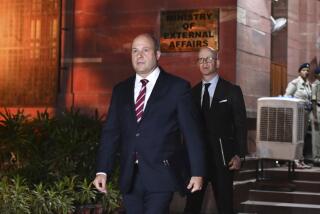Chavez orders U.S. envoy to leave
- Share via
BUENOS AIRES — Venezuelan President Hugo Chavez said Thursday that he was expelling the U.S. ambassador in the latest escalation of tensions between Washington and Latin American leftists.
The move came a day after Bolivian President Evo Morales, a close Chavez ally, accused the U.S. envoy in his country of fostering divisions and ordered him to leave.
On Thursday, chaos worsened in Bolivia as clashes between government sympathizers and opponents in a remote province left at least eight dead and dozens injured. And Washington retaliated for the expulsion of Ambassador Philip S. Goldberg by telling Bolivia’s ambassador, Gustavo Guzman, to leave.
In a speech laced with obscenities directed at the United States, Chavez told a cheering crowd that he acted in solidarity with Morales. Earlier, he said his country would come to Morales’ aid if “Yankee stooges” tried to oust him.
Chavez and the Bush administration have been bitter rivals for years. Although this latest step signals a further deterioration, it is not clear how the expulsions will affect the region’s political and economic stability.
Washington will continue to have diplomatic relations with Venezuela and Bolivia, at least for now. And Venezuela remains a major source of oil for the U.S.
On Thursday, Chavez renewed threats to cut off supplies should Washington launch “some aggression” against Venezuela, but stopped well short of stopping sales.
Still, expulsions of U.S. ambassadors are relatively rare and the moves shocked the region.
“This is a highly symbolic gesture,” said Eduardo Gamarra, a professor at Florida International University in Miami. “And they’re doing it at a time when no one in Washington is paying much attention to Latin America.”
For years, the administration has sought to play down suggestions that an anti-U.S. leftist bloc was forming in Latin America while the White House was preoccupied in the Middle East. U.S. officials have contended that Washington would be making a mistake to overreact to Chavez.
But Morales and Chavez have been eager to prove that they pose a serious regional challenge. This week, the Venezuelans moved a step further by allowing Russian long-range bombers to visit a base, suggesting that greater military contacts might be ahead.
Venezuela and Bolivia have also reached out to Iran, angering Washington.
Chavez has found allies in Morales and Ecuadorean President Rafael Correa. But most governments in the region, including left-leaning administrations in Brazil and Argentina, have tried to maintain cordial relations with both Venezuela and the U.S.
The expulsion of Patrick Duddy after a year in Venezuela appeared to have little to do with his public actions. The ambassador has kept a low profile compared with his predecessor, William Brownfield, who sometimes responded to Chavez’s anti-U.S. invective.
Chavez threatened to eject the ambassador a week ago in response to criticism from White House drug czar John P. Walters that his country wasn’t doing enough to stop the flow of illegal drugs. Earlier, Chavez denounced a plot against him that he said was abetted by the United States, an allegation Washington denies.
Chavez said he also was recalling Caracas’ ambassador in Washington, Bernardo Alvarez, until “there’s a new government in the United States.”
Throughout Latin America, Chavez has positioned himself as the prime opponent to “Yankee imperialism,” a phrase he often invokes.
“If we have to create one Vietnam, two Vietnams, three Vietnams, here we are ready,” Chavez said Thursday, echoing a phrase of Che Guevara, the late revolutionary leader. “Because we are not going to take hope away from our people.”
In Bolivia, threats against gas pipelines have forced officials to restrict exports to giant neighbors Brazil and Argentina in the last two days. The government has shipped additional soldiers to energy fields to protect the pipelines.
U.S. State Department spokesman Sean McCormack said in Washington that Bolivia’s decision to expel Goldberg “will prejudice the interests of both countries, undermine the ongoing fight against drug trafficking and will have serious regional implications.”
Bolivia is the world’s third-largest producer of coca leaf, the raw material in cocaine, and a major recipient of U.S. anti-drug aid. But Morales rose to national prominence as president of a coca growers federation, a post he still holds, and has often been at odds with U.S.-backed anti-drug efforts.
The president frequently accused the ambassador of undermining his government. Morales was apparently incensed when Goldberg met recently with the governors of two provinces who oppose him.
Various South American nations, including Brazil, pledged support for Morales’ government and offered help if needed to mediate the crisis.
Morales took office in 2006 amid hopes for national reconciliation in a country long riven by political, ethnic and regional differences. He was the first Indian president in a nation where much of the population is of indigenous ancestry.
But his socialist policies and rhetorical flourishes soon caused discontent in the eastern lowlands, home to much of the nation’s agricultural and energy wealth. He accused “oligarchs” of seeking to break away from Bolivia.
Four lowland states voted this year for autonomy in a referendum Morales called treasonous and illegal. A fifth state, Chuquisaca, in the central highlands, has joined the four lowland provinces in opposition to Morales, whose base of support is in the western altiplano.
--
--
McDonnell reported from Buenos Aires and Kraul from Rio de Janeiro. Andres D’Alessandro of The Times’ Buenos Aires Bureau, Times staff writer Paul Richter in Washington and special correspondents Oscar Ordonez in La Paz, Bolivia, and Martin Monasterio in Santa Cruz, Bolivia, contributed to this report.
More to Read
Sign up for Essential California
The most important California stories and recommendations in your inbox every morning.
You may occasionally receive promotional content from the Los Angeles Times.










